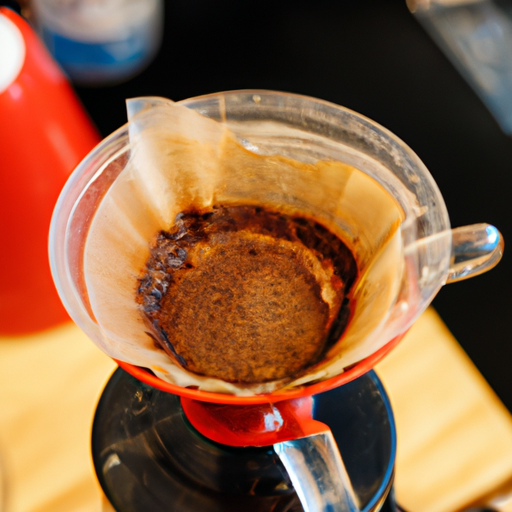This post may contains affiliate links which means I may receive a commission from purchases made through links. Learn more on my affiliate disclaimer.
The Importance of Water Quality in Coffee Brewing
Water quality plays a crucial role in the coffee brewing process. The composition of water can greatly affect the taste, aroma, and overall quality of the final cup. It is important to understand and consider various factors such as mineral content, pH levels, water hardness, and filtration when brewing coffee.
One key aspect to consider with coffee brewing is the mineral content in water. Minerals like calcium and magnesium contribute to enhancing the flavors in coffee. They help extract desirable compounds from coffee grounds during coffee brewing, resulting in a more balanced and flavorful cup. However, excessive minerals can also lead to an unpleasant taste or residue buildup in equipment. Finding the right balance is essential for achieving optimal results.
Another factor that significantly impacts coffee brewing is water hardness. Hard water contains high levels of minerals whereas soft water has lower mineral content. Coffee brewing with hard water may result in over-extraction due to increased solubility of compounds from beans, leading to a bitter or harsh taste. On the other hand, using soft water may result in under-extraction and a weak flavor profile. Understanding your local tap water’s hardness level allows you to adjust your brewing methods accordingly.
Furthermore, pH levels play a significant role in determining coffee flavor profiles as well. The ideal pH range for brewing coffee falls between 6-7 on the pH scale (slightly acidic). Water with higher acidity can bring out brighter flavors but might also make it too sour or tangy if not properly balanced with other variables like brew time or grind size.
In summary, paying attention to water quality is vital for achieving consistent and delicious cups of coffee. Considering factors such as mineral content, hardness level, and pH helps ensure proper extraction while avoiding undesirable tastes or inconsistencies caused by poor-quality water sources.
Understanding the Impact of Water Temperature on Coffee Brewing
The temperature of the water used in coffee brewing plays a crucial role in the extraction process. The ideal water temperature for extracting flavors from coffee grounds is typically between 195°F and 205°F (90°C to 96°C). If the water is too hot, it can result in over-extraction, leading to bitter and unpleasant flavors. On the other hand, if the water is too cold, under-extraction may occur, resulting in weak and lackluster flavors.
When hot water comes into contact with coffee grounds, it causes them to release various compounds that contribute to aroma, flavor, and body. Higher temperatures generally lead to faster extraction rates as heat accelerates chemical reactions. This means that using hotter water can result in a shorter coffee brewing time but also increases the risk of over-extraction.
It’s important to note that different types of coffee beans may require slightly different temperature ranges for optimal extraction. For example, lighter roast coffees tend to benefit from slightly lower temperatures compared to darker roasts. Experimenting with different temperatures while keeping within the recommended range allows you to fine-tune your coffee brewing process and achieve a cup of coffee that showcases its unique characteristics.
Exploring Different Water-to-Coffee Ratios for Brewing
When it comes to coffee brewing the perfect cup of coffee, the ratio of water to coffee grounds plays a crucial role in determining the flavor and strength of the final brew. Experimenting with different water-to-coffee ratios can lead to exciting discoveries and allow you to tailor your brewing process to suit your personal taste preferences.
One common starting point is using a 1:16 ratio, which means using 1 part coffee grounds for every 16 parts water. This ratio tends to produce a balanced cup with moderate strength. However, if you prefer a stronger brew, you can try increasing the amount of coffee grounds while keeping the same amount of water. Conversely, if you find your coffee too strong or overpowering, reducing the amount of coffee grounds may result in a more mellow flavor.
It’s important to note that different coffee brewing methods may require slight adjustments in terms of water-to-coffee ratios. For example, pour-over methods like Chemex or V60 typically benefit from using slightly higher ratios such as 1:15 or even 1:14 for a bolder flavor profile. On the other hand, immersion methods like French press or AeroPress often work well with lower ratios such as 1:17 or 1:18 for a cleaner and smoother taste.
By exploring different water-to-coffee ratios during your coffee brewing process, you have the opportunity to fine-tune your recipe and discover new nuances in flavor profiles. Remember that personal preference plays an essential role here; what works for one person may not necessarily be ideal for another. So don’t be afraid to experiment and adjust until you find that perfect balance that satisfies your palate each morning!
The Significance of Water Hardness in Coffee Taste
Water hardness plays a significant role in the taste of coffee. Hard water contains high levels of minerals, such as calcium and magnesium, which can have both positive and negative effects on the flavor profile of brewed coffee.
On one hand, these minerals can enhance the overall taste by adding complexity and depth to the brew. Calcium ions, for example, can help extract desirable flavors from coffee grounds during coffee brewing. Magnesium ions contribute to a smoother mouthfeel and can balance out any bitterness or acidity in the final cup.
However, excessive mineral content in hard water can also lead to undesirable outcomes. For instance, it may result in over-extraction of certain compounds that give off harsh or unpleasant flavors. This is particularly true for highly soluble compounds like caffeine and tannins.
To achieve optimal results when coffee brewing with hard water, it is important to find a balance between extracting desirable flavors while avoiding excessive extraction of unwanted compounds. Experimenting with different grind sizes or adjusting coffee brewing time can help mitigate any negative impacts associated with water hardness.
Understanding how water hardness affects coffee taste allows brewers to make informed decisions about their brew methods and adjust variables accordingly. By considering this aspect alongside other factors like temperature and ratio, enthusiasts can unlock the full potential of their beans and create consistently delicious cups of coffee every time they brew.
Delving into the Effects of pH Levels on Coffee Flavor
Delving into the Effects of pH Levels on Coffee Flavor
The acidity or alkalinity of water, as measured by its pH level, can have a significant impact on the flavor profile of coffee. The pH level affects how various compounds in coffee are extracted during coffee brewing, ultimately influencing the taste and overall experience of enjoying a cup of joe.
When water with a high pH (alkaline) is used for coffee brewing, it tends to result in a more bitter taste. This is because alkaline water extracts more acidic compounds from the coffee grounds, leading to an imbalanced flavor profile. On the other hand, using water with a low pH (acidic) can result in an overly sour or sharp taste due to excessive extraction of certain compounds.
Achieving the optimal balance is key when it comes to pH levels and coffee flavor. Ideally, the pH should be slightly acidic – around 6-7 – which allows for proper extraction without overpowering or dulling specific flavors. It’s important for brewers to consider their local water source and take steps to adjust its pH if necessary through filtration or additives like citric acid.
Understanding how different levels of acidity or alkalinity affect coffee flavor allows enthusiasts and professionals alike to fine-tune their coffee brewing methods for consistently delicious results. By paying attention to this often overlooked aspect of coffee preparation, one can unlock new depths and nuances in every brew that enhance the overall enjoyment of this beloved beverage.
- Water pH levels can significantly impact the flavor profile of coffee
- High pH (alkaline) water can result in a more bitter taste
- Alkaline water extracts more acidic compounds from coffee grounds, leading to an imbalanced flavor profile
- Low pH (acidic) water can result in an overly sour or sharp taste due to excessive extraction of certain compounds
- The optimal balance for coffee flavor is slightly acidic, around 6-7 on the pH scale
- Proper extraction without overpowering or dulling specific flavors is achieved with a slightly acidic pH level
- Brewers should consider their local water source and adjust its pH if necessary through filtration or additives like citric acid
- Understanding how acidity or alkalinity affects coffee flavor allows enthusiasts and professionals to fine-tune brewing methods for consistently delicious results
- Paying attention to the often overlooked aspect of water pH levels enhances the overall enjoyment of every cup of coffee.
How Water Flow Rate Affects Coffee Extraction
Water flow rate plays a crucial role in the extraction process of coffee. The speed at which water passes through the coffee grounds can significantly impact the flavor and strength of the final brew.
A slow water flow rate allows for more contact time between the water and coffee grounds, resulting in a stronger and more flavorful cup of coffee. This is because slower flow rates allow for better extraction of soluble compounds from the grounds, including oils, acids, and sugars. As a result, you may notice richer flavors and bolder aromas in your brewed coffee when using a slower flow rate.
On the other hand, a fast water flow rate can lead to under-extraction of coffee grounds. When water rushes through too quickly, it doesn’t have enough time to fully extract all the desirable compounds from the grounds. This can result in a weaker and less flavorful cup of coffee with muted or imbalanced flavors.
Finding the right balance between water flow rate and extraction time is essential for achieving optimal results in coffee brewing. Experimenting with different flow rates can help you fine-tune your coffee brewing technique to suit your personal taste preferences. It’s worth noting that factors such as grind size and dosage also play roles in determining how water flows through your coffee bed during coffee brewing.
The Role of Minerals in Enhancing Coffee Taste
Enhancing the taste of coffee is a delicate art, and one factor that plays a significant role in achieving this is the presence of minerals in water. Minerals such as calcium, magnesium, and potassium can have a profound impact on the flavor profile of coffee. These minerals interact with the compounds present in coffee beans during extraction, influencing both aroma and taste.
Calcium, for example, helps to enhance acidity in coffee by binding to certain acids present in the beans. This results in a brighter and more vibrant flavor profile. Magnesium, on the other hand, can contribute to a smoother and more balanced cup of coffee by reducing bitterness. Potassium has been found to enhance sweetness and add complexity to the overall taste experience.
It’s important to note that while minerals are essential for enhancing coffee taste, their concentration should be within an optimal range. Too high or too low mineral content can lead to undesirable flavors or even affect extraction efficiency. Therefore, understanding water composition and its mineral content is crucial for achieving consistent results when brewing coffee.
By paying attention to water quality and ensuring an appropriate balance of minerals like calcium, magnesium, and potassium, baristas or home brewers have greater control over their brews’ final taste profiles. Experimenting with different mineral compositions can help unlock new dimensions of flavor in your favorite cup of joe. So next time you’re brewing your morning brew or savoring specialty coffees at your local café; take a moment to appreciate how minerals play an integral role in enhancing every sip you enjoy!
Analyzing the Relationship Between Water Composition and Coffee Aroma
Analyzing the Relationship Between Water Composition and Coffee Aroma
Water composition plays a crucial role in determining the aroma of coffee. The various minerals and chemicals present in water can greatly impact the flavors that are extracted during the brewing process. One key factor to consider is the mineral content of the water, as certain minerals can enhance or detract from the overall aroma of the coffee. For example, magnesium has been found to enhance fruity and floral aromas, while high levels of bicarbonate ions can lead to a more bitter taste. By understanding how different minerals interact with coffee compounds, we can better control water composition to achieve desired aromas.
Another important aspect of water composition is its pH level. The acidity or alkalinity of water can have a significant impact on coffee flavor and aroma. Generally, slightly acidic water (pH around 6-7) is considered ideal for coffee brewing as it helps extract desirable flavors without overpowering bitterness. However, extreme variations in pH can result in off-flavors and alter the balance between sweetness and acidity in coffee. Therefore, maintaining proper pH levels through careful monitoring and adjustment is essential for achieving optimal aroma.
Lastly, filtration methods used to purify tap water also influence its composition and subsequently affect coffee aroma. Different filtering techniques remove impurities such as chlorine or heavy metals that may negatively impact flavor profiles by introducing unwanted tastes or odors into brewed coffee. Additionally, some filters may strip away essential minerals necessary for extracting desirable aromatic compounds from roasted beans. Considering this relationship between filtration methods and water composition allows us to make informed choices about which filter systems best preserve or enhance desired aromas during coffee brewing.
Understanding how different aspects of water composition interact with coffee compounds provides valuable insights into optimizing brews for enhanced aromas. By carefully controlling mineral content, adjusting pH levels appropriately, and selecting suitable filtration methods based on specific preferences for aromatic profiles, baristas and home brewers alike can elevate their sensory experience when enjoying a cup of coffee.
Exploring the Influence of Water Filtering on Coffee Brewing
Water filtering plays a crucial role in coffee brewing, as it helps to remove impurities and improve the overall quality of the water used. When water is filtered properly, it can enhance the flavors and aromas of the coffee, resulting in a more enjoyable cup.
One important aspect of water filtering is removing chlorine and other chemicals that may be present in tap water. These substances can have a negative impact on the taste of coffee, giving it an unpleasant or bitter flavor. By using a filter to remove these impurities, you can ensure that your coffee tastes clean and pure.
Additionally, filtering water can also help to prevent mineral buildup in your coffee machine or coffee brewing equipment. Hard water contains high levels of minerals such as calcium and magnesium, which can accumulate over time and affect the performance of your equipment. By using filtered water, you can minimize this buildup and extend the lifespan of your coffee brewing tools.
In summary, investing in a good quality water filter is essential for achieving optimal results when coffee brewing. It not only improves the taste by removing unwanted chemicals but also helps to maintain your equipment’s longevity by preventing mineral buildup. So next time you make yourself a cup of joe, consider how filtering your water could elevate your coffee experience even further.
Understanding the Role of Water in Achieving Consistent Coffee Extraction
Understanding the Role of Water in Achieving Consistent Coffee Extraction
Water plays a critical role in achieving consistent coffee extraction. The quality and composition of water can greatly impact the flavor, aroma, and overall taste of brewed coffee. One important factor to consider is water temperature. The ideal temperature for coffee brewing is between 195-205°F (90-96°C). This range allows for optimal extraction of flavors from the coffee grounds without over-extracting or under-extracting them.
Another aspect to consider is the water-to-coffee ratio. Finding the right balance between water and coffee grounds is crucial for achieving consistent extraction. Too much water can result in weak and watery coffee, while too little can lead to an overly strong and bitter brew. Experimenting with different ratios can help determine the perfect balance that suits your personal taste preferences.
Additionally, water hardness also affects coffee taste. Hard water contains high levels of minerals such as calcium and magnesium, which can interfere with proper extraction by binding to flavor compounds in the beans. On the other hand, soft water lacks these minerals and may result in a flat-tasting cup of coffee. It’s important to find a balance by either using filtered or treated tap water or adjusting mineral content through additives like bicarbonate soda.
In conclusion, understanding how various factors related to water affect coffee extraction is essential for consistently brewing a delicious cup of joe. From temperature control to finding the right ratio and managing mineral content, each element contributes to unlocking the full potential of your chosen beans’ flavors and aromas.
Frequently Asked Questions (FAQ’s)
Why is water quality important in coffee brewing?
Water quality affects the taste and extraction of coffee, as impurities in water can alter the flavor and aroma.
How does water temperature impact coffee extraction?
Water temperature affects the rate at which coffee is extracted. Higher temperatures can lead to over-extraction, resulting in a bitter taste, while lower temperatures may under-extract, resulting in a weak flavor.
What is the ideal water-to-coffee ratio for coffee brewing?
The ideal water-to-coffee ratio can vary depending on personal preference, but a common starting point is 1:16, where 1 part coffee is brewed with 16 parts water.
How does water hardness affect coffee taste?
Water hardness, which refers to the mineral content in water, can affect the taste of coffee. Hard water can result in a more pronounced and sometimes unpleasant flavor, while soft water can lead to a more delicate taste.
What is the impact of pH levels on coffee flavor?
pH levels can influence the acidity or bitterness of coffee. A balanced pH level is generally preferred for a well-rounded flavor profile.
How does water flow rate affect coffee extraction?
Water flow rate affects the extraction time and can impact the strength and flavor of coffee. A slower flow rate generally leads to a stronger extraction, while a faster flow rate may result in a weaker brew.
What role do minerals play in enhancing coffee taste?
Minerals in water, such as calcium and magnesium, can enhance the flavor of coffee by adding complexity and depth to the taste.
How does water composition influence coffee aroma?
The composition of water, including its mineral content and impurities, can affect the aroma of coffee. Clean, filtered water generally allows for a more pronounced and pleasant aroma.
Does water filtering affect coffee brewing?
Yes, water filtering can remove impurities and improve the taste of coffee. Filtered water often leads to a cleaner and more balanced flavor.
Why is water important in achieving consistent coffee extraction?
Water is a crucial element in coffee extraction as it directly interacts with the coffee grounds. Understanding and controlling water quality, temperature, ratios, hardness, pH levels, flow rate, minerals, composition, and filtering can help achieve consistent and desired results in coffee flavor and extraction.





